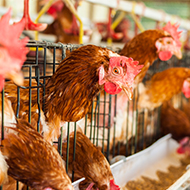Study finds evidence that crabs can feel pain
The reserachers recorded brain activity in reponse to both physical and chemical stimuli.
Scientists have said that the way shellfish are killed needs to change, following a new study that suggests that shore crabs can feel pain.
Researchers from the University of Gothenburg, Sweden, used EEG-style measurements to test the response of shore crabs to different stimuli.
Although previous observational studies had suggested that crustaceans might feel pain, the researchers were the first to study the brain activity of shore crabs to test for signs that they can feel pain.
Eleftherios Kasiouras, lead author of the study, explained: “We could see that the crab has some kind of pain receptors in its soft tissues, because we recorded an increase in brain activity when we applied a potentially painful chemical, a form of vinegar, to the crab's soft tissues. The same happened when we applied external pressure to several of the crab's body parts”
Although the crabs responded to both forms of stimuli, the researchers recorded a shorter and more intense response to physical stress than chemical stress.
Shellfish are not currently covered by animal welfare legislation in the EU despite being widely used in science and aquaculture. In the UK, decapod crustaceans such as lobsters, octopuses and crabs were recognised in 2021 as sentient beings under the Animal Welfare (Sentience) Bill.
Lynne Sneddon, zoophysiologist at the University of Gothenburg, said: “We need to find less painful ways to kill shellfish if we are to continue eating them. Because now we have scientific evidence that they both experience and react to pain.”
The study has been published in the journal Biology.
Image © Shutterstock)



 An Avian Influenza Prevention Zone (AIPZ) has been introduced across Wales.
An Avian Influenza Prevention Zone (AIPZ) has been introduced across Wales.